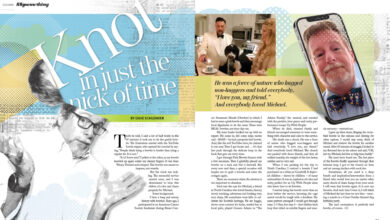Montessori House of Ocala provides a relaxed, comfortable interactive learning environment that seems like an extension of your home.
Story: Maritza Manresa
Photography: Chris Redd
For Sam Guerra of Ocala, the Montessori House of Ocala is more than just school for his two sons, eight-year-old Salvatore and seven-year-old Dominic; it is an extension of his home. As a single parent, he is not only faced with the common challenges associated with raising children in today’s society, but he is also faced with the challenge of raising two elementary school-aged boys alone. However, for Guerra this challenge is not as difficult as it could have been, had it not been for all of the support and encouragement he has received from the kids’ school – the Montessori House of Ocala.
Guerra could not be happier with the education the children are receiving, not only academically but also morally and spiritually. The children are well adjusted, intelligent and caring children who have learned much more than math, science and language. The children have also learned about being respectful, responsible and kind. According to Guerra, “The school’s teaching philosophy does not concentrate on just teaching a curriculum, they are teaching the whole child.”
The caring atmosphere is clearly evident upon entering the school. Teachers are not only teachers, they are also mentors for the children and are there to offer love and support to every single child in the school. Every child receives one on one attention and direction from the teachers and administration. For Guerra, the fact that the children are complimented often on their work and achievements, which in turns encourages the children to try even harder, is one of the most impressive points of the teaching philosophy at the Montessori House of Ocala. For Guerra, it is very comforting when he leaves his children in the morning to know that his children will be learning in a safe and caring environment all day while he is at work, which is a great part of what the Montessori learning philosophy is all about. In particular, one of the most wonderful things about the Montessori House elementary school program is the interaction between children of different age groups, creating communities in which the older children freely share their knowledge with the younger children.
Children learn concepts spontaneously while working individually with the many exciting and challenging resources available to them in the classroom.The Montessori philosophy is a unique approach for the children to learn. Instead of teaching the child specific concepts, children learn in an environment designed to stimulate their interest and facilitates their understanding, thus stimulating their learning capabilities. Montessori classrooms are designed in such a way that children can learn at their own pace and through all five senses, making the learning process challenging and exciting. Following the Montessori philosophy, education is a hands-on approach to learning. For instance, elementary school classrooms do not have the customary school desks arranged in rows. Rather, children work at tables that make learning inviting and appealing to the child. Additionally, each classroom has well-defined spaces for each section of the curriculum, such as math, arts, language and culture. Each of these well-defined spaces is characterized by shelves and tables supplied with an assortment of learning materials for the children to choose. Classrooms are supplied with colorful and stimulating learning materials made from a variety of textures, colors and materials that the children can stack, sort and manipulate while learning at the same time. In addition to the traditional learning tools found in the Montessori classroom, the Montessori House has computers and a Smart Board in the classrooms that the teachers and children use for specific lessons. Education in the elementary school classrooms, as well as other age groups, is not about learning and memorizing individual facts, it is about taking a concept and seeing all the things that may relate to it – figuring out and learning about all the possibilities relating to it. Children do not just learn things on paper, so whatever the concept is, the children see it, feel it, relate to it and learn it. For example, learning the concept of orange, the children do not just learn the color, they learn about the texture of an orange, the taste, how it grows and all the things you can do with it. Montessori classrooms, for all ages, at the Montessori House of Ocala, are designed in such a way that children can learn at their own pace and through all five senses, thus, making the learning process challenging and exciting for children.
According to Jill Ferrer, Founder and Director of the Montessori House of Ocala, “The methodology is very hands on and focused on the needs of each individual child. They learn according to each child’s ability, by following a specific Montessori curriculum.” That is why children in the same classroom may be moving through the program at a very different pace and although in the same class, children may be working on different subjects at the same time. Additionally, children with special needs will receive the special attention they require.
At the Montessori House of Ocala, not only do the children get the special attention they need, but the parents also get the special attention they deserve. Constant communication and feedback between parents, teachers, and administration is an integral part of the program at the school.
Not only are parents encouraged to get involved in their children’s school activities, they are also kept informed of their child’s progress on a regular basis. In turn, administration also likes to be kept informed of issues that may be surfacing at home so the school can offer support. The school’s goal is to work as a team with the parents to provide the children the best education and upbringing possible. Simply put by Guerra, “Montessori House of Ocala is preparing these kids to be kind, productive citizens in the future.”






